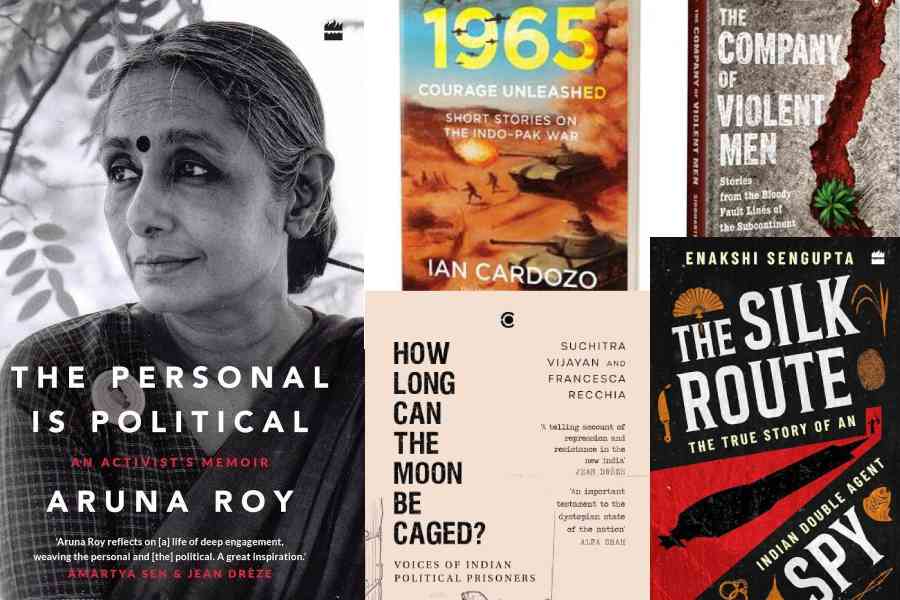1 The Personal is Political: An Activist’s Memoir
by Aruna Roy
The Magsaysay award-winning social activist Aruna Roy’s startlingly forthright memoir is the story of two parallel journeys — a fifty-year-long engagement with public action in India, and a personal narrative that traces how the author has striven to convert her ideological convictions into practice. The Personal is Political (HarperCollins Publishers) is a powerful account of her life’s work as a social activist and advocate for marginalised communities in India. The book weaves together personal anecdotes, political analysis, and reflections on her experiences as a woman in a patriarchal society.
2 1965 Courage Unleashed
by Ian Cardozo
Releasing on August 15, 1965 Courage Unleashed by Ian Cardozo (Penguin Random House India) is a compilation of short stories on the Indo-Pakistan war that started as a localised conflict in Jammu & Kashmir and exploded into a complex all-out war fought on a much bigger scale than the wars of 1947–48, 1962, 1971 and 1999. The book highlights the human dimension of war through the dramatic personal experiences of army and air force officers that astonish and overwhelm one’s imagination. It will convince the reader that real life is often stranger than fiction. The book also brings to light little-known facts that occurred across land, sea and air.
3 The Company of Violent Men by Siddharthya Roy
Siddharthya Roy’s The Company of Violent Men: Stories from the Bloody Fault Lines of the Subcontinent is an unflinching and deeply personal narrative that takes readers on a journey through some of the most turbulent regions in South Asia, revealing the nuanced and often overlooked human stories behind the headlines. The book also tries to explain terrorism and conflict and goes beyond the general rhetoric of “good vs evil”.
4 How Long Can The Moon Be Caged by Suchitra Vijayan and Francesca Recchia
Suchitra Vijayan, the author of the critically acclaimed Midnight’s Borders: A People’s History of Modern India, and Francesca Recchia, an independent researcher and writer who is the creative director and a founding member of The Polis Project have teamed up for an extraordinary book that serves as a reminder of the many voices that are languishing in jail. How Long Can The Moon Be Caged: Voices Of Indian Political Prisoners (Westland Books) is a powerful look at the experiences of political prisoners and tells their stories through objects and papers, poems and stories.
5 The Silk Route Spy by Enakshi Sengupta
Promising to be a page-turner, Enakshi Sengupta’s The Silk Route Spy is the true tale of a pre-Independence era double agent Nandlal Kapur. The researcher and academician fuses history, nostalgia, and a plot full of twists and turns in the book that offers a rare glimpse into India of the British Raj, while taking the reader along on a spy’s journey — one full of dare-devil exploits, perilous encounters, and tantalising threats.
6 Rebellion in Ranchi by Swati Sengupta
Part of the Song of Freedom series that explores the lives of children across India during the struggle for independence, Swati Sengupta’s Rebellion in Ranchi is set in 1915 and chronicles the Sibu whose life is changing as the Oraons who live in the forests of Chota Nagpur, are slowly moving to the Tana Bhagat movement, where they begin to protest the injustices that the zamindars and the British Raj perpetrate on the Adivasis.
7 Tilak: The Empire’s Biggest Enemy by Vaibhav Purandare
Tilak: The Empire’s Biggest Enemy, written by Vaibhav Purandare, marks the 167th year of Bal Gangadhar Tilak’s birth anniversary. Touted as the first comprehensive biography of the formidable leader, who was instrumental in transforming India’s quest for freedom from a political discourse into a powerful mass movement, the biography speaks of how India’s massive political revolution and the anti-colonial fight were unleashed and acquired momentum.
8 The Fifteen by Angellica Aribam and Akash Satyawali
We all know about BR Ambedkar, Jawaharlal Nehru, and Rajendra Prasad among others who were instrumental in the making of the Constitution. But little do we know of the women who were part of it. The Fifteen: The Lives and Times of the Women in India’s Constituent Assembly authored by Angellica Aribam and Akash Satyawali is a keenly researched book that chronicles the lives of these trailblazing women, recounting the influences that shaped them, the norms they defied, and the convictions they stood for.
9 Who is Equal? By Saurabh Kirpal
The question of equality haunts us even after 75 years of independence. Saurabh Kirpal’s book, Who is Equal? examines how the right to equality has influenced citizens’ lives in various domains, including employment, education, marriage, and business. From the philosophical and historical development of this right to its modern application by the courts, the book offers a comprehensive overview of the law of the land.
10 The Battle of Haji Pir by Kulpreet Yadav
Kulprit Yadav’s latest work, The Battle of Haji Pir provides a poignant glimpse into the lives of the Indian soldiers who bravely captured the strategic Haji Pir Pass during the 1965 Indo-Pak war. Blending historical accuracy, personal accounts, and emotional resonance, the book promises to enthral readers. The book delves into the emotional and psychological impact of the battle, offering a profoundly human perspective on the harsh realities of warfare.










